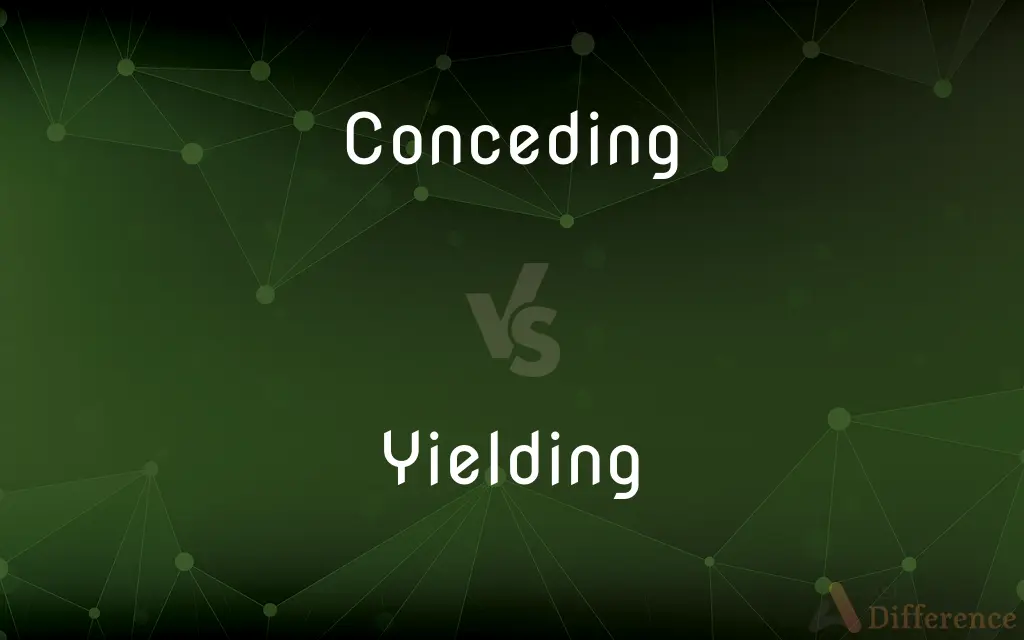Conceding vs. Yielding — What's the Difference?
Edited by Tayyaba Rehman — By Fiza Rafique — Published on November 29, 2023
"Conceding" refers to reluctantly accepting something as true or appropriate, while "Yielding" involves giving way to arguments, demands, or pressure.

Difference Between Conceding and Yielding
Table of Contents
ADVERTISEMENT
Key Differences
"Conceding" often denotes an admission or acceptance, generally after a period of resistance or denial. It's typically employed when acknowledging a point in a debate or dispute. "Yielding," while similar, tends to lean towards the act of surrendering or giving way, potentially due to pressure or force. Thus, "Conceding" usually involves granting a point or admitting a position, while "Yielding" often signifies a relinquishment of control or position.
During a debate, one might be "Conceding" a point, indicating an acceptance of the opponent's argument as valid or correct. Meanwhile, "Yielding" in a similar context might imply giving up one’s speaking time or position to another. Both convey an element of relinquishment, but "Conceding" leans towards the acknowledgment of the validity of a point, while "Yielding" often denotes surrendering position or control.
In a legal or business scenario, "Conceding" could relate to acknowledging a particular aspect of a case or a negotiation point as true or acceptable. "Yielding," conversely, could pertain to relinquishing a claim, territory, or right. Thus, while "Conceding" engages with the recognition of aspects or points, "Yielding" implies a more tangible or physical giving way or surrendering.
When discussing conflict or argument, "Conceding" might involve admitting an opponent's point is valid, though not necessarily shifting one’s stance entirely. "Yielding," however, might involve relinquishing one’s stance or position, surrendering to the other party’s demands or points. So, while "Conceding" involves an element of acceptance or admission, "Yielding" involves a more practical surrender or giving way.
In sports, a team might be "Conceding" a point by accepting the other team's score as valid. Conversely, a player might be "Yielding" their position or spot to another player, perhaps due to injury or strategy. "Conceding" here involves acknowledgment, while "Yielding" involves a physical surrender or giving way.
ADVERTISEMENT
Comparison Chart
Definition
Accepting as true or appropriate.
Giving way to arguments, demands, or pressure.
Focus
Acknowledgment
Surrender
Usage Context
Often in debates or acknowledgments
Could be physical or argumentative surrender
Emotional Weight
May involve reluctance or resistance
Might involve pressure or force
Application
Can be specific or general
Often involves a tangible surrender
Compare with Definitions
Conceding
Allowing or granting a point or right.
The company is Conceding certain privileges to new employees.
Yielding
Relinquishing possession or control.
The team is Yielding its lead in the game.
Conceding
Admitting to a fact or outcome reluctantly.
He is Conceding that he lost the game.
Yielding
Surrendering to a force or authority.
The knight is Yielding to the king.
Conceding
Acknowledging an opponent’s point in a debate.
She is Conceding his point about climate change.
Yielding
Giving way under pressure.
The door is Yielding under the impacts.
Conceding
Accepting a particular outcome.
The general is Conceding the loss of the battle.
Yielding
Producing or providing.
The land is Yielding abundant crops.
Conceding
Surrendering or giving up in a non-physical realm.
The politician is Conceding the election.
Yielding
Inclined to give way to pressure, argument, or influence; docile.
Conceding
To acknowledge, often reluctantly, as being true, just, or proper; admit
Conceded that we made a mistake.
Yielding
Present participle of yield
Conceding
To acknowledge or admit (defeat).
Yielding
Docile, or inclined to give way to pressure.
Conceding
To acknowledge defeat in
Concede an election.
Concede a chess match.
Yielding
A concession.
Conceding
To yield or surrender (something owned or disputed, such as land)
Conceded the region when signing the treaty.
Yielding
Inclined to give way, or comply; flexible; compliant; accommodating; as, a yielding temper.
Conceding
To yield or grant (a privilege or right, for example).
Yielding
A verbal act of admitting defeat
Conceding
(Sports) To allow (a goal or point, for example) to be scored by the opposing team or player.
Yielding
The act of conceding or yielding
Conceding
To make a concession or acknowledge defeat; yield
The losing candidate conceded after the polls had closed.
Yielding
Inclined to yield to argument or influence or control;
A timid yielding person
Conceding
Infl of concede
Yielding
Lacking stiffness and giving way to pressure;
A deep yielding layer of foam rubber
Conceding
Signifying a concession.
Yielding
Tending to give in or surrender or agree;
Too yielding to make a stand against any encroachments
Conceding
The act of conceding or yielding.
Yielding
Happy to comply
Conceding
The act of conceding or yielding
Yielding
Allowing another to proceed.
The car is Yielding to pedestrians.
Common Curiosities
Can both "conceding" and "yielding" relate to surrender?
Yes, both can imply a form of surrender. "Conceding" can mean surrendering an argument, while "yielding" can refer to surrendering to a force or authority.
How is "yielding" defined in English?
"Yielding" means giving way to pressure or demands, or producing something as a result.
What is the basic meaning of "conceding"?
"Conceding" generally means admitting or acknowledging something, often reluctantly or after resistance.
Can "yielding" be related to a material's property?
Yes, "yielding" can describe when a material deforms under stress but returns to its original shape when the stress is removed.
How might "conceding" be used in a sports context?
In sports, "conceding" often refers to admitting a loss or giving the opponent a certain point or advantage.
What might be a context for "conceding" in politics?
In politics, a candidate might be described as "conceding" when they admit defeat after an election.
Is "yielding" only used in the context of giving up?
No, "yielding" can also refer to producing or generating, as in "The orchard is yielding a good crop this year."
How do "conceding" and "yielding" differ in terms of acknowledgment?
"Conceding" implies a more direct admission or acknowledgment, while "yielding" can be more about action or behavior indicating acknowledgment.
Is yielding always a sign of weakness?
Not necessarily. It can be strategic, as in traffic rules or negotiations.
Is "conceding" always a sign of weakness?
Not necessarily. Sometimes, conceding can be strategic or show maturity by acknowledging the truth or superiority of another's point.
Is "Yielding" mainly a physical action?
It can be physical, like a material yielding, or metaphorical, like yielding to someone's wishes.
Can roads have "yield" signs? What do they mean?
Yes, a "yield" sign on roads indicates that drivers must prepare to stop if necessary to let another driver proceed.
Can you concede in a formal debate?
Yes, you might concede a point to the opposing side.
Can conceding be seen as a sign of maturity?
Often, yes. It can show willingness to see different perspectives.
Can a material be both conceding and yielding?
In a way. It can concede (acknowledge) its limits and then yield (give way) under pressure.
Can "Yielding" be temporary?
Certainly. One might yield momentarily before regaining control or strength.
Is "Yielding" a passive action?
It can be, but it's often a conscious choice, like yielding the right of way.
Can "yielding" refer to investment returns?
Yes, in finance, "yield" often refers to the income return on an investment, like dividends or interest.
Are "Conceding" and "Yielding" synonyms?
They overlap in meaning but differ in nuances. "Conceding" emphasizes acknowledgment, while "Yielding" emphasizes giving way.
Is conceding always reluctant?
Not necessarily, but it often implies a change in stance after some resistance.
In what contexts is "Yielding" most commonly used?
Traffic rules, physical scenarios, and power dynamics, among others.
Can you concede without admitting defeat?
Yes, you can concede a point without conceding an entire argument.
Are there situations where conceding is strategic?
Yes, in debates or negotiations, conceding smaller points might help achieve a larger goal.
Are both "Conceding" and "Yielding" signs of compromise?
Often, yes. Both can indicate a form of acquiescence or adjustment to circumstances.
Can you concede without fully surrendering?
Yes, conceding might mean acknowledging a point without giving up entirely.
Can "Yielding" refer to producing results?
Yes, like an investment yielding returns.
Share Your Discovery

Previous Comparison
Himalayan Rivers vs. Peninsular Rivers
Next Comparison
1040 Forms vs. 1099 FormsAuthor Spotlight
Written by
Fiza RafiqueFiza Rafique is a skilled content writer at AskDifference.com, where she meticulously refines and enhances written pieces. Drawing from her vast editorial expertise, Fiza ensures clarity, accuracy, and precision in every article. Passionate about language, she continually seeks to elevate the quality of content for readers worldwide.
Edited by
Tayyaba RehmanTayyaba Rehman is a distinguished writer, currently serving as a primary contributor to askdifference.com. As a researcher in semantics and etymology, Tayyaba's passion for the complexity of languages and their distinctions has found a perfect home on the platform. Tayyaba delves into the intricacies of language, distinguishing between commonly confused words and phrases, thereby providing clarity for readers worldwide.
















































